News
Earlyworks Co., Ltd., a blockchain technology provider, forms business alliance with Relic, a business co-creation company
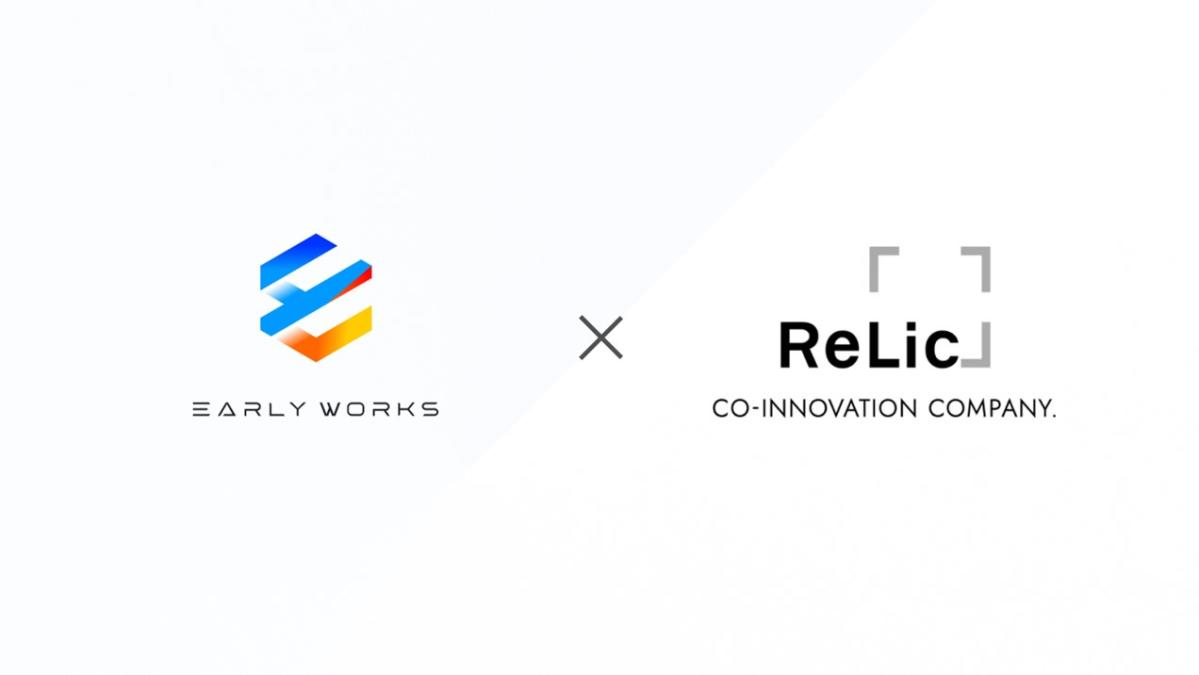
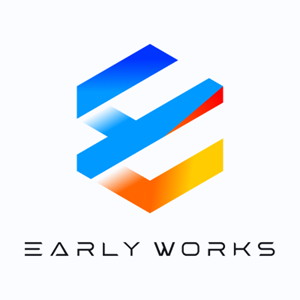

EARLYWORKS CO., LTD.
Providing a new business development scheme that leverages “DUALii” with cutting-edge technology utilizing Web3
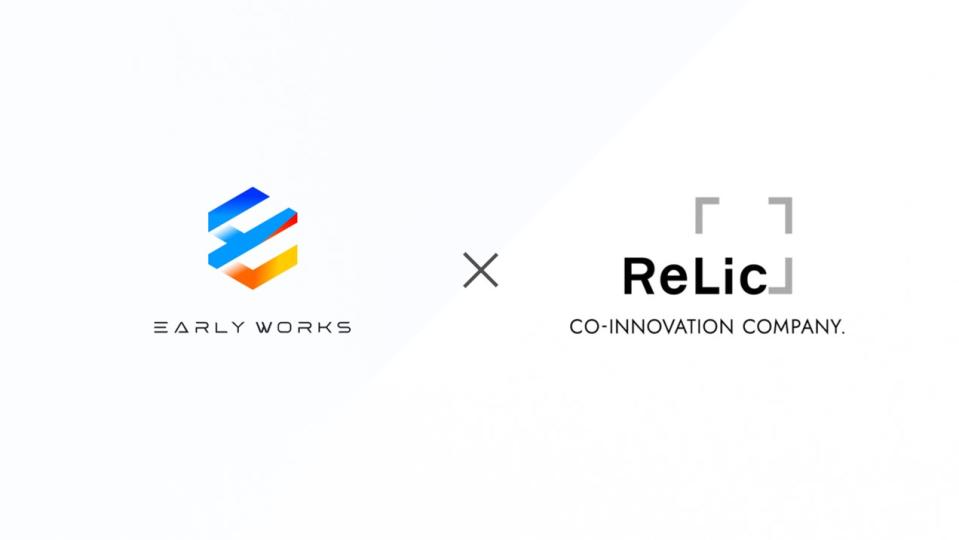

Business alliance with Earlyworks and ReLic
TOKYO, May 21, 2024 (GLOBE NEWSWIRE) — Earlyworks Co., Ltd. (Nasdaq: ELWS) (the “Company” or “Earlyworks”) (Head office: Taito-ku, Tokyo; CEO: Satoshi Kobayashi), a blockchain solution provider that deploys its high-speed proprietary blockchain technology Grid Ledger System (“GLS”), announces a business alliance with Relic Inc. (Head Office: Shibuya-ku, Tokyo; CEO: Takaaki Kitajima; hereinafter “Relic”), a business co-creation company that supports new business development and innovation creation of Japanese companies, to promote new business development utilizing Web3 technology.
Under this alliance, Earlyworks’ business development assets utilizing Web3 cutting-edge technology will be combined with Relic’s organizational capabilities and expertise in all phases and areas of new business development, to jointly support new business development utilizing Web3 cutting-edge technology. Earlyworks and Relic will jointly develop and widely provide a new business development scheme that addresses business issues, brand damage risks, legal and financial risks, etc., faced by large companies by linking DUALii, an incubation partner platform that allows companies to build optimal co-creation systems through flexible involvement schemes and diverse exit strategies with Earlyworks’ proprietary blockchain technology.
■Market Potential and Alliance Background
The global market for blockchain, a leading Web3 technology, continues to grow every year and is expected to reach approximately $10.6 billion in 2023 and $404.1 billion in 2030 (*1). The market is expected to grow 38-fold in the seven years from 2023 to 2030, and such huge market growth is attracting more attention around the world.
On the other hand, the Japanese blockchain market is expected to be worth 142.7 billion JPY (*2) in 2023, and compared to the global market size, Japan’s market share is estimated to be about 10%.
In Japan, the “Priority Policy Program for Realizing Digital Society ” approved by the Cabinet in June 2022 includes “Promoting Web3.0”, which in turn includes the use of NFTs (non-fungible tokens) based on blockchain technology,” and the “Web 3.0 Study Group” was established at the Digital Agency to study the future use of blockchain. Although the “Web 3.0 Study Group” has been established at the Digital Agency and has been increasing its activities, the actual business use of blockchain has yet to increase significantly.
Story continues
By forming a business alliance with Relic, the Company intends to promote the development of the Japanese blockchain market and address the following issues: the high hurdles involved in correctly understanding the technical characteristics of blockchain and properly utilizing it in business, as well as a lack of human resources and know-how to take charge of new business development.
The Company has focused on new businesses development that utilizes blockchain technology in recent years, for example, by developing accompanying systems and operating services after they are launched. In July 2023, the Company was listed on the Nasdaq Capital Market in the United States. Going forward, as a Japan-based blockchain solution provider, the Company will further maximize the potential of blockchain technology for the world and vigorously promote its implementation in society.
Relic is a “business co-creation company” that supports new business development and innovation creation of Japanese companies. The “Open Innovation Business” co-creates innovation through investment in startups and joint ventures/joint ventures with large companies.
In the blockchain area, Relic has launched ReFi Lab, a business support platform utilizing Web 3.0 and blockchain technology, with Hakuhodo Key3 and others, and is conducting consortium activities. In addition, Relic’s MetaMe®️ metacommunication service, which utilizes NTT DOCOMO’s advanced technology, has developed the “MetaMe NFT Market” in collaboration with Earlyworks.
In addition, through activities over the past eight years since company’s establishment, Relic has been involved in the development of more than 4,000 companies and 20,000 new businesses. Relic also has the organizational strength to handle the full spectrum of new business development, and provide the broad and extensive support that is possible only with the largest integrated business, technology, and creative team (BTC organization) specializing in new business.
Through this partnership, Earlyworks’ assets for business development utilizing blockchain technology and Relic’s organizational capabilities and know-how for various phases and areas of new business development will be combined to jointly support new business development utilizing blockchain technology.
Joint business development support by GLS x DUALii
In today’s highly uncertain and rapidly changing era, it is essential for new business development to go through a process of speedy hypothesis testing, business problem solving, and improvement based on real feedback and reactions from customers and users. However, when a large company tries to launch a new business, it is not always possible for the company to properly promote the above process due to various reasons and restrictions. Many of the new businesses being considered by large companies face a combination of problems, such as “slow business development speed,” “forced withdrawal and failure to commercialize,” “no significant growth even if commercialized,” “significant risk of brand damage,” and “too high indirect costs incurred when entering new business areas.” The problems are compounded by such issues as “slow business commercialization,” and “slow business growth even after commercialization”.
Relic offers DUALii as a solution to the above problems faced by large companies, in which Relic acts as the operating entity to launch the business after hypothesis testing, and in terms of organizational design and financing, Relic can construct a flexible and optimal scheme and management system according to the business phase and business content.
By combining DUALii with Earlyworks’ GLS, which has blockchain technology characteristics and high processing performance, a new business model utilizing advanced Web3 technology can be realized with a flexible structure and high technical capabilities.
■Examples of partnerships
Joint support for new business development by organically combining the services of both companies (GLS x DUALii)
System integration of services and products of both companies
Joint development of new business development support solutions/products
About GLS (Grid Ledger System), a proprietary blockchain infrastructure technology
GLS is a hybrid blockchain that combines the technical advantages of both blockchain technology and database technology. Database technology provides the traditional infrastructure for data storage, collection, organization and processing, and enables the construction of systems. GLS has high processing power like a database, ease of implementation and high customizability, as well as the blockchain’s characteristics of tamper-resistance and convenience.
< Main features of the GLS >
high processing speed
parallel processing and auto-scale functions
high tamper-resistance
zero server downtime
versatile applications
enabled emergency stop
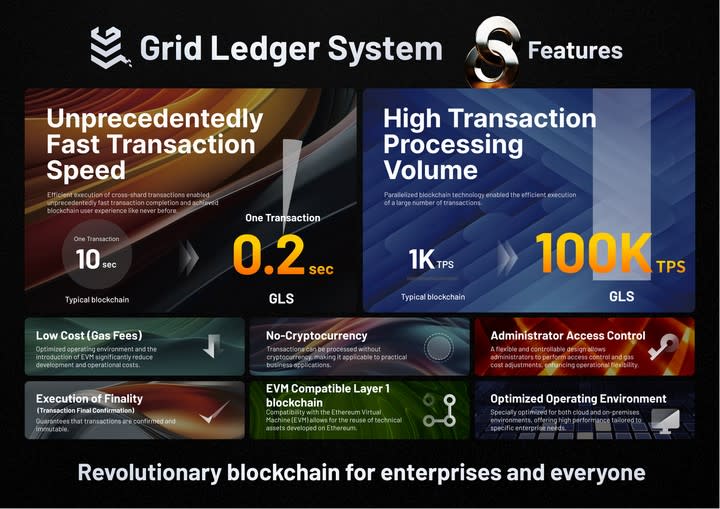

TBC
https://gls.e-arly.works/ja/new-business
1 Blockchain Market Forecast to 2030 Global Information, Inc. https://www.gii.co.jp/report/smrc1308673-blockchain-market-forecasts-global-analysis-by.html )
2 Future Trends of Blockchain Market size forecast by 2028 with AI xenoBrain (https://service.xenobrain.jp/forecastresults/market-size/blockchain)
■About DUALii, an incubation partner platform
DUALii is an incubation partner platform that enables large companies to build the optimal co-creation system for their issues and problems through flexible involvement schemes and diverse exit strategies. In addition to business planning, hypothesis testing, product and service development, marketing, sales and customer management, maintenance and operation, growth, customer success, etc., Relic takes on the roles and responsibilities as a business provider on behalf of large companies. This enables the creation of unprecedented, groundbreaking businesses that combine the concepts and assets of large corporations with the agility and execution capabilities of venture and start-up companies.
Incubation partner platform “DUALii” official website
https://relic.co.jp/services/dualii/
Relic Corporation Company Profile
Company name: Relic Inc.
Representative: Takaaki Kitajima, Representative Director and CEO
Head Office: Yebisu Garden Place Tower 19F, 4-20-3 Ebisu, Shibuya-ku, Tokyo
Established: August 2015
Business activities: incubation tech business, business production/new business development support business, open innovation business
Corporate website: https://relic.co.jp/
Relic Inc. is a “business co-creation company” that supports new business development and innovation creation for Japanese enterprises. Relic Inc. has been interactively developing three main businesses: the “Incubation Tech Business,” which provides a SaaS-based platform specializing in unprecedented new business development, the “Business Production/New Business Development Support Business,” which comprehensively supports new business and innovation creation, and the “Open Innovation Business,” which collaborates with startup companies through investment and joint ventures with large enterprises to co-create innovation. Through eight years of operation with involvement in over 4,000 companies and 20,000 new business developments, Relic Inc. has established itself as a leading company in the field of supporting and co-creating new businesses and innovations with unparalleled value and significance as well as the achievement of industry-leading scale and growth.
Earlyworks Company Profile
Earlyworks Co., Ltd.
Location : 3F MR Building, 5-7-11 Ueno, Taito-ku, Tokyo
Representative: Satoshi Kobayashi, Representative Director and CEO
Business description: Providing system solutions using GLS
Date of Establishment : May 2018
Corporate website : https://e-arly.works/
Earlyworks Co., Ltd. is a Japanese company operating its proprietary private blockchain technology, GLS, to leverage blockchain technology in various applications in a wide range of industries. GLS is a hybrid blockchain that combines the technical advantages of blockchain and database technology. GLS features high-speed processing, which can reach 0.016 seconds per transaction, tamper-resistance, security, zero server downtime, and versatile applications. The applicability of GLS is verified in multiple domains, including real estate, advertisement, telecommunications, metaverse, and financial services. The Company’s mission is to keep updating GLS and make it an infrastructure in the coming Web3/metaverse-like data society.
For inquiries from the press regarding this matter, please contact
Earlyworks Co., Ltd.
E-MAIL: [email protected]
Forward-Looking Statements
Certain statements in this announcement are forward-looking statements. These forward-looking statements involve known and unknown risks and uncertainties and are based on the Company’s current expectations and projections about future events that the Company believes may affect its financial condition, results of operations, business strategy and financial needs. Investors can find many (but not all) of these statements by the use of words such as “approximates,” “believes,” “hopes,” “expects,” “anticipates,” “estimates,” “projects,” “intends,” “plans,” “will,” “would,” “should,” “could,” “may,” or other similar expressions. The Company undertakes no obligation to update or revise publicly any forward-looking statements to reflect subsequent occurring events or circumstances, or changes in its expectations, except as may be required by law. Although the Company believes that the expectations expressed in these forward-looking statements are reasonable, it cannot assure you that such expectations will turn out to be correct, and the Company cautions investors that actual results may differ materially from the anticipated results and encourages investors to review other factors that may affect its future results in the Company’s registration statement and other filings with the U.S. Securities and Exchange Commission.
Photos accompanying this announcement are available at:
https://www.globenewswire.com/NewsRoom/AttachmentNg/603d99d5-113f-46bd-b90c-9ff44f21ee04
https://www.globenewswire.com/NewsRoom/AttachmentNg/d6aa8f4c-4967-413e-826d-c8a535d03ddd
News
Terra Can’t Catch a Break as Blockchain Gets $6 Million Exploited

The attack, which exploited a vulnerability disclosed in April, drained around 60 million ASTRO tokens, sending the price plummeting.
The Terra blockchain has been exploited for over $6 million, forcing developers to take a momentary break the chain.
Beosin Cyber Security Company reported that the protocol lost 60 million ASTRO tokens, 3.5 million USDC, 500,000 USDT, and 2.7 BTC or $180,000.
Terra developers paused the chain on Wednesday morning to apply an emergency patch that would address the attack. Moments later, a 67% majority of validators upgraded their nodes and resumed block production.
The ASTRO token has plunged as much as 75%. It is now trading at $0.03, a 25% decline on the day. Traders who took advantage of the drop are now on 195%.
The vulnerability that took down the Cosmos-based blockchain was disclosed in April and involved the deployment of a malicious CosmWasm contract. It opened the door to attacks via what is called an “ibc-hooks callback timeout reentrancy vulnerability,” which is used to invoke contracts and enable cross-chain swaps.
Terra 2.0 also suffered a massive drop in total value locked (TVL) in April, shortly after the vulnerability was discovered. It plunged 80% to $6 million from $30 million in TVL and has since lost nearly half of that value, currently sitting at $3.9 million.
The current Earth chain emerged from the rubble as a hard fork after the original blockchain, now called Terra Classic, collapsed in 2022. Terra collapsed after its algorithmic stablecoin (UST) lost its peg, causing a run on deposits. More than $50 billion of UST’s market cap was wiped out in a matter of days.
Terraform Labs, the company behind the blockchain, has been slowly unravelling its legal woes since its mid-2022 crash. Founder Do Kwon awaits sentencing in Montenegro after he and his company were found liable for $40 billion in customer funds in early April.
On June 12, Terraform Labs settled with the SEC for $4.4 billion, for which the company will pay about $3.59 billion plus interest and a $420 million penalty. Meanwhile, Kwon will pay $204.3 million, including $110 million in restitution, interest and an $80 million penalty, a court filing showed.
News
Google and Coinbase Veterans Raise $5M to Build Icebreaker, Blockchain’s Answer to LinkedIn

Icebreaker: Think LinkedIn but on a Blockchain—announced Wednesday that it has secured $5 million in seed funding. CoinFund led the round, with participation from Accomplice, Anagram, and Legion Capital, among others.
The company, which is valued at $21 million, aims to become the world’s first open-source network for professional connections. Its co-founders, Dan Stone and Jack Dillé, come from Google AND Monetary base; Stone was a product manager at the cryptocurrency giant and also the co-creator of Google’s largest multi-identity measurement and marketing platform, while Dillé was a design manager for Google Working area.
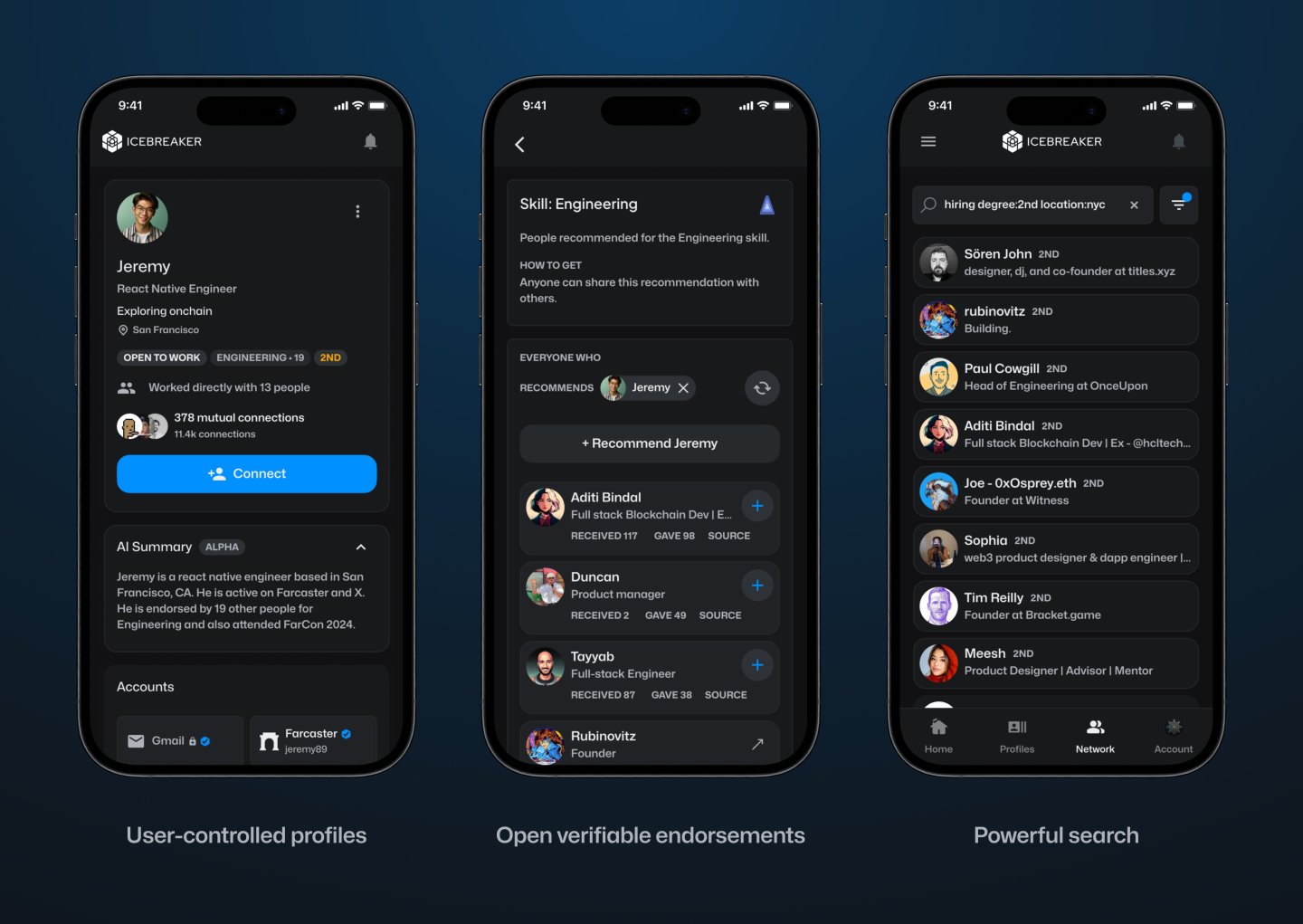
The pair founded Icebreaker on the shared belief that the imprint of one’s digital identity (and reputation) should not be owned by a single entity, but rather publicly owned and accessible to all. Frustrated that platforms like LinkedIn To limit how we leverage our connections, Dillé told Fortune he hopes to remove paywalls and credits, which “force us to pay just to browse our network.” Using blockchain technology, Icebreaker lets users transfer their existing professional profile and network into a single, verified channel.
“Imagine clicking the login button and then seeing your entire network on LinkedIn, ChirpingFarcaster and email? Imagine how many introductions could be routed more effectively if you could see the full picture of how you’re connected to someone,” Stone told Fortune.
Users can instantly prove their credentials and provide verifiable endorsements for people in their network. The idea is to create an “open graph of reputation and identity,” according to the founders. They hope to challenge LinkedIn’s closed network that “secures data,” freeing users to search for candidates and opportunities wherever they are online. By building on-chain, the founders note, they will create a public ledger of shared context and trust.
Verified channels are now launched for
Chirping
Online Guide
Wallet
Discord
Telephone
TeleporterYou can find them in Account -> Linked Accounts Italian: https://t.co/mRDyuWW8O2
— Icebreaker (@icebreaker_xyz) April 3, 2024
“Digital networking is increasingly saturated with noise and AI-driven fake personas,” the founders said in a statement. For example: Dillé’s LinkedIn headline reads “CEO of Google,” a small piece of digital performance art to draw attention to unverifiable information on Web2 social networks that can leave both candidates and recruiters vulnerable to false claims.
“Icebreaker was created to enable professionals to seamlessly tap into their existing profiles and networks to surface exceptional people and opportunities, using recent advances in cryptographically verifiable identity,” the company said, adding that the new funding will go towards expanding its team and developing products.
“One of the next significant use cases for cryptocurrency is the development of fundamental social graphs for applications to leverage… We are proud to support Dan, Jack and their team in their mission to bring true professional identity ownership to everyone online,” said CoinFund CIO Alex Felix in a statement.
Learn more about all things cryptocurrency with short, easy-to-read flashcards. Click here to Fortune’s Crash Course in Cryptocurrency.
Fuente
News
Luxembourg proposes updates to blockchain laws | Insights and resources
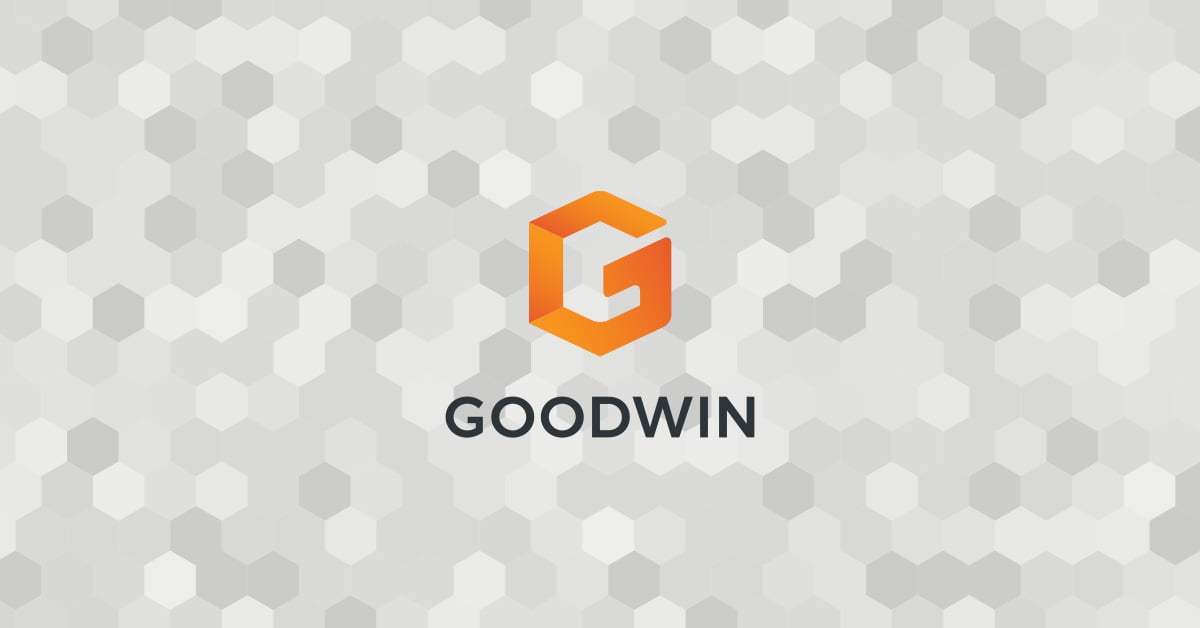
On July 24, 2024, the Ministry of Finance proposed Blockchain Bill IVwhich will provide greater flexibility and legal certainty for issuers using Distributed Ledger Technology (DLT). The bill will update three of Luxembourg’s financial laws, the Law of 6 April 2013 on dematerialised securitiesTHE Law of 5 April 1993 on the financial sector and the Law of 23 December 1998 establishing a financial sector supervisory commissionThis bill includes the additional option of a supervisory agent role and the inclusion of equity securities in dematerialized form.
DLT and Luxembourg
DLT is increasingly used in the financial and fund management sector in Luxembourg, offering numerous benefits and transforming various aspects of the industry.
Here are some examples:
- Digital Bonds: Luxembourg has seen multiple digital bond issuances via DLT. For example, the European Investment Bank has issued bonds that are registered, transferred and stored via DLT processes. These bonds are governed by Luxembourg law and registered on proprietary DLT platforms.
- Fund Administration: DLT can streamline fund administration processes, offering new opportunities and efficiencies for intermediaries, and can do the following:
- Automate capital calls and distributions using smart contracts,
- Simplify audits and ensure reporting accuracy through transparent and immutable transaction records.
- Warranty Management: Luxembourg-based DLT platforms allow clients to swap ownership of baskets of securities between different collateral pools at precise times.
- Tokenization: DLT is used to tokenize various assets, including real estate and luxury goods, by representing them in a tokenized and fractionalized format on the blockchain. This process can improve the liquidity and accessibility of traditionally illiquid assets.
- Tokenization of investment funds: DLT is being explored for the tokenization of investment funds, which can streamline the supply chain, reduce costs, and enable faster transactions. DLT can automate various elements of the supply chain, reducing the need for reconciliations between entities such as custodians, administrators, and investment managers.
- Issuance, settlement and payment platforms:Market participants are developing trusted networks using DLT technology to serve as a single source of shared truth among participants in financial instrument investment ecosystems.
- Legal framework: Luxembourg has adapted its legal framework to accommodate DLT, recognising the validity and enforceability of DLT-based financial instruments. This includes the following:
- Allow the use of DLT for the issuance of dematerialized securities,
- Recognize DLT for the circulation of securities,
- Enabling financial collateral arrangements on DLT financial instruments.
- Regulatory compliance: DLT can improve transparency in fund share ownership and regulatory compliance, providing fund managers with new opportunities for liquidity management and operational efficiency.
- Financial inclusion: By leveraging DLT, Luxembourg aims to promote greater financial inclusion and participation, potentially creating a more diverse and resilient financial system.
- Governance and ethics:The implementation of DLT can promote higher standards of governance and ethics, contributing to a more sustainable and responsible financial sector.
Luxembourg’s approach to DLT in finance and fund management is characterised by a principle of technology neutrality, recognising that innovative processes and technologies can contribute to improving financial services. This is exemplified by its commitment to creating a compatible legal and regulatory framework.
Short story
Luxembourg has already enacted three major blockchain-related laws, often referred to as Blockchain I, II and III.
Blockchain Law I (2019): This law, passed on March 1, 2019, was one of the first in the EU to recognize blockchain as equivalent to traditional transactions. It allowed the use of DLT for account registration, transfer, and materialization of securities.
Blockchain Law II (2021): Enacted on 22 January 2021, this law strengthened the Luxembourg legal framework on dematerialised securities. It recognised the possibility of using secure electronic registration mechanisms to issue such securities and expanded access for all credit institutions and investment firms.
Blockchain Act III (2023): Also known as Bill 8055, this is the most recent law in the blockchain field and was passed on March 14, 2023. This law has integrated the Luxembourg DLT framework in the following way:
- Update of the Act of 5 August 2005 on provisions relating to financial collateral to enable the use of electronic DLT as collateral on financial instruments registered in securities accounts,
- Implementation of EU Regulation 2022/858 on a pilot scheme for DLT-based market infrastructures (DLT Pilot Regulation),
- Redefining the notion of financial instruments in Law of 5 April 1993 on the financial sector and the Law of 30 May 2018 on financial instruments markets to align with the corresponding European regulations, including MiFID.
The Blockchain III Act strengthened the collateral rules for digital assets and aimed to increase legal certainty by allowing securities accounts on DLT to be pledged, while maintaining the efficient system of the 2005 Act on Financial Collateral Arrangements.
With the Blockchain IV bill, Luxembourg will build on the foundations laid by previous Blockchain laws and aims to consolidate Luxembourg’s position as a leading hub for financial innovation in Europe.
Blockchain Bill IV
The key provisions of the Blockchain IV bill include the following:
- Expanded scope: The bill expands the Luxembourg DLT legal framework to include equity securities in addition to debt securities. This expansion will allow the fund industry and transfer agents to use DLT to manage registers of shares and units, as well as to process fund shares.
- New role of the control agent: The bill introduces the role of a control agent as an alternative to the central account custodian for the issuance of dematerialised securities via DLT. This control agent can be an EU investment firm or a credit institution chosen by the issuer. This new role does not replace the current central account custodian, but, like all other roles, it must be notified to the Commission de Surveillance du Secteur Financier (CSSF), which is designated as the competent supervisory authority. The notification must be submitted two months after the control agent starts its activities.
- Responsibilities of the control agent: The control agent will manage the securities issuance account, verify the consistency between the securities issued and those registered on the DLT network, and supervise the chain of custody of the securities at the account holder and investor level.
- Simplified payment processesThe bill allows issuers to meet payment obligations under securities (such as interest, dividends or repayments) as soon as they have paid the relevant amounts to the paying agent, settlement agent or central account custodian.
- Simplified issuance and reconciliationThe bill simplifies the process of issuing, holding and reconciling dematerialized securities through DLT, eliminating the need for a central custodian to have a second level of custody and allowing securities to be credited directly to the accounts of investors or their delegates.
- Smart Contract Integration:The new processes can be executed using smart contracts with the assistance of the control agent, potentially increasing efficiency and reducing intermediation.
These changes are expected to bring several benefits to the Luxembourg financial sector, including:
- Fund Operations: Greater efficiency and reduced costs by leveraging DLT for the issuance and transfer of fund shares.
- Financial transactions: Greater transparency and security.
- Transparency of the regulatory environment: Increased attractiveness and competitiveness of the Luxembourg financial centre through greater legal clarity and flexibility for issuers and investors using DLT.
- Smart Contracts: Potential for automation of contractual terms, reduction of intermediaries and improvement of transaction traceability through smart contracts.
Blockchain Bill IV is part of Luxembourg’s ongoing strategy to develop a strong digital ecosystem as part of its economy and maintain its status as a leading hub for financial innovation. Luxembourg is positioning itself at the forefront of Europe’s growing digital financial landscape by constantly updating its regulatory framework.
Local regulations, such as Luxembourg law, complement European regulations by providing a more specific legal framework, adapted to local specificities. These local laws, together with European initiatives, aim to improve both the use and the security of projects involving new technologies. They help establish clear standards and promote consumer trust, while promoting innovation and ensuring better protection against potential risks associated with these emerging technologies. Check out our latest posts on these topics and, for more information on this law, blockchain technology and the tokenization mechanism, do not hesitate to contact us.
We are available to discuss any project related to digital finance, cryptocurrencies and disruptive technologies.
This informational piece, which may be considered advertising under the ethics rules of some jurisdictions, is provided with the understanding that it does not constitute the rendering of legal or other professional advice by Goodwin or its attorneys. Past results do not guarantee a similar outcome.
News
New bill pushes Department of Veterans Affairs to examine how blockchain can improve its work

The Department of Veterans Affairs would have to evaluate how blockchain technology could be used to improve benefits and services offered to veterans, according to a legislative proposal introduced Tuesday.
The bill, sponsored by Rep. Nancy Mace, R-S.C., would direct the VA to “conduct a comprehensive study of the feasibility, potential benefits, and risks associated with using distributed ledger technology in various programs and services.”
Distributed ledger technology, including blockchain, is used to protect and track information by storing data across multiple computers and keeping a record of its use.
According to the text of the legislation, which Mace’s office shared exclusively with Nextgov/FCW ahead of its publication, blockchain “could significantly improve benefits allocation, insurance program management, and recordkeeping within the Department of Veterans Affairs.”
“We need to bring the federal government into the 21st century,” Mace said in a statement. “This bill will open the door to research on improving outdated systems that fail our veterans because we owe it to them to use every tool at our disposal to improve their lives.”
Within one year of the law taking effect, the Department of Veterans Affairs will be required to submit a report to the House and Senate Veterans Affairs committees detailing its findings, as well as the benefits and risks identified in using the technology.
The mandatory review is expected to include information on how the department’s use of blockchain could improve the way benefits decisions are administered, improve the management and security of veterans’ personal data, streamline the insurance claims process, and “increase transparency and accountability in service delivery.”
The Department of Veterans Affairs has been studying the potential benefits of using distributed ledger technology, with the department emission a request for information in November 2021 seeking input from contractors on how blockchain could be leveraged, in part, to streamline its supply chains and “secure data sharing between institutions.”
The VA’s National Institute of Artificial Intelligence has also valued the use of blockchain, with three of the use cases tested during the 2021 AI tech sprint focused on examining its capabilities.
Mace previously introduced a May bill that would direct Customs and Border Protection to create a public blockchain platform to store and share data collected at U.S. borders.
Lawmakers also proposed additional measures that would push the Department of Veterans Affairs to consider adopting other modernized technologies to improve veteran services.
Rep. David Valadao, R-Calif., introduced legislation in June that would have directed the department to report to lawmakers on how it plans to expand the use of “certain automation tools” to process veterans’ claims. The House of Representatives Subcommittee on Disability Assistance and Memorial Affairs gave a favorable hearing on the congressman’s bill during a Markup of July 23.
-

 Videos9 months ago
Videos9 months agoCrypto News: Bitcoin, ETH Price, CPI Print, PYTH, WIF & MORE!!
-

 Videos9 months ago
Videos9 months agoCrypto News: Bitcoin Price, ETF, ETH, WIF, HNT & MORE!!
-
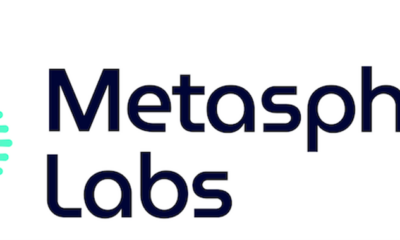
 DeFi9 months ago
DeFi9 months agoMetasphere Labs announces follow-up event regarding
-

 Videos9 months ago
Videos9 months agoSolana price potential?! Check out THIS update if you own SOL!!
-

 Videos8 months ago
Videos8 months agoWho Really CONTROLS THE MARKETS!! Her plans REVEALED!!
-

 DeFi6 months ago
DeFi6 months agoPump.Fun Overtakes Ethereum in Daily Revenue: A New Leader in DeFi
-

 News6 months ago
News6 months agoNew bill pushes Department of Veterans Affairs to examine how blockchain can improve its work
-

 DeFi6 months ago
DeFi6 months agoDegens Can Now Create Memecoins From Tweets
-

 News6 months ago
News6 months agoLawmakers, regulators to study impact of blockchain and cryptocurrency in Alabama • Alabama Reflector
-

 Bitcoin6 months ago
Bitcoin6 months ago1 Top Cryptocurrency That Could Surge Over 4,300%, According to This Wall Street Firm
-

 Ethereum8 months ago
Ethereum8 months agoComment deux frères auraient dérobé 25 millions de dollars lors d’un braquage d’Ethereum de 12 secondes • The Register
-

 Videos8 months ago
Videos8 months agoCryptocurrency News: BTC Rally, ETH, SOL, FTM, USDT Recover & MORE!














 ASTRO Price
ASTRO Price


